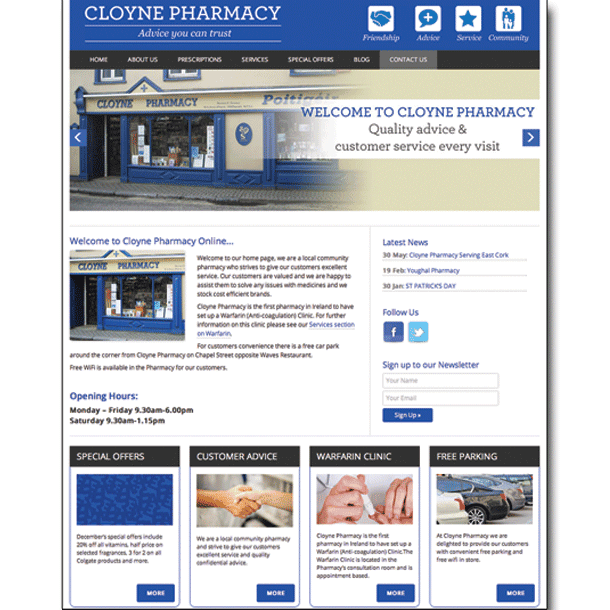Summary
This is Ireland’s first and, so far, only community pharmacy-based anticoagulation clinic. Based in Cloyne, the clinic was borne out of a need for patients to have their INR monitored locally rather than face a commute of 45 minutes to the nearest hospital-based clinic. The team has worked with local hospitals and is able to provide care that is more cost-effective than that provided by the secondary care setting.
Recently there has been much interest in the community pharmacy-based service from healthcare bodies in Ireland such as The Pharmacy Regulator, The Health Services Executive, The Pharmaceutical Society of Northern Ireland as well as the Centre for Pharmacoeconomics in Dublin.
Challenge
In early 2009, an elderly patient on warfarin approached Dermot Twomey concerning strial fibrillation, frustrated at having to regularly attend a hospital-based anticoagulation clinic in Cork, 45 minutes’ drive from his home. He asked whether a service could be provided locally.
Twomey agreed to enquire, although at this stage he had no interest in warfarin or anticoagulation, and like most pharmacists felt that it was a tricky medicine to deal with. He discovered that University College Cork was running a two-day anticoagulation course in April 2009, which he was eligible to attend.
Objectives
The main aim was to move from a pilot clinic working closely with Cork University Hospital (CUH) to a satelite clinic working independently, but with channels for referral to CUH. The project also aimed to collate data on clinic’s first year, and to have this entered on a computerised software system.
Another objective was to communicate with cardiology consultants and GPs whose patients attend the service. Twomey also wanted to have at least one other pharmacist working alongside him.
An external audit of the work was to be carried out, looking specifically at TTR data and patient satisfaction. A final objective was to demonstrate the clinic’s work to decision makers, with a view to having the service rolled out nationally.
Solution
A survey of Cloyne Pharmacy patients found that 65 per cent of those surveyed would be happy to have this service at their local pharmacy, and to pay for it.
Twomey underwent training, then developed protocols in conjunction with Dr O’Shea at CUH.
All results were communicated on a daily basis with Dr O’Shea and Dr Duggan at CUH for the first year of the clinic. The Cloyne clinic effectively mirrored the work of the hospital, performing the same duties and dosing as the staff at the hospital-based clinic.
After two informal external assessment meetings, CUH consultant haematologist Dr Mary Cahill concluded that she was happy with all aspects of the service. Dr O’Shea subsequently agreed that the daily faxing of results sheets was no longer required.
Results
Some 80 patients have attended the clinic, resulting in 2500 INRs. None have been referred to the hospital due to high INR. No bed time has been lost in preparing patients for cardioversion.
A cost analysis of the clinic’s service versus that of CUH found patient costs down by €18 per one per cent increase in TTR, in favour of Cloyne Pharmacy. Clinic costs fell by €3.12 per one per cent increase in TTR, again in favour of the pharmacy.
Since approximately 60 per cent of the clinic’s warfarin patients suffer from AF and have not experienced a serious clot or bleed, the health service will see significant savings due to a reduction in thromboembolic events.
Learnings
Key points would be to take small steps, constantly review what has been done, document it and discuss it with colleagues. Mistakes will be made, particularly when pushing boundaries, but the key message is to learn from them.
Twomey found it particularly helpful to keep a chronological list of milestones reached and why they were significant. This was helpful for remembering the hurdles that had to be overcome (when reviewing) at a later stage. He also found it important to ask himself why he was doing what he was doing.
Evaluation
From a patient perspective, advantages of the pharmacy service included lower travel and hospital parking costs, a reduction in time spent waiting in line and in some cases a carer no longer needing to take time off work to bring the patient to the clinic. The pharmacy clinic is appointment-based, with the patient generally out within 15 minutes.
A 2014 patient survey showed an increase in patient knowledge compared with a 2012 survey.
Patient satisfaction with the new clinic is high – 95.8 per cent of patients said ‘yes’ to all questions regarding patient satisfaction and 100% considered it value for money. Many patients felt that there was also an opportunity during the consultation to discuss other healthcare concerns.



